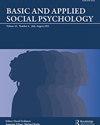通过说服过程促进健康饮食习惯
IF 1.8
3区 心理学
Q2 PSYCHOLOGY, SOCIAL
引用次数: 5
摘要
健康饮食运动的成功影响往往取决于信息在改变态度和行为方面的有效程度。目前的工作提出,健康饮食运动的设计可以考虑到阐述和验证过程,使态度改变的程度最大程度地受到影响,是相应的。本综述中描述的第一组研究表明,在确定对健康食品的初始态度以及随后的态度强度后果(例如,稳定性、行为预测、传播)时,考虑细化的重要性。第二组研究的重点是一个人的思想的感知有效性的作用,在进食领域作为一个潜在的中介说服过程。这些研究包括宣传对健康饮食的积极态度(例如,吃蔬菜和水果)的运动,以及旨在减少不健康食品摄入的干预措施(例如,对垃圾食品征税)。我们还讨论了这些研究中信息呈现方式(例如,口头和视觉信息vs.直接身体体验)的作用。最后,该综述提供了一个指南,其中包含具体建议,研究人员、从业人员和公共政策制定者可以遵循,以预测短期和长期的态度和行为变化。本文章由计算机程序翻译,如有差异,请以英文原文为准。
Promoting Healthy Eating Practices through Persuasion Processes
Abstract The successful impact of healthy eating campaigns often depends on the extent to which messages are effective in changing attitudes and behaviors over time. The present work proposes that healthy eating campaigns can be designed taking into consideration elaboration and validation processes so that the degree of attitude change is maximally influenced and is consequential. The first set of studies described in this review demonstrates the importance of considering elaboration in determining initial attitudes toward healthy foods as well as the subsequent attitude strength consequences (e.g., stability, prediction of behavior, spreading). The second set of studies focuses on the role of perceived validity of one’s thoughts in the domain of eating as a potential mediator of the persuasion process. These studies include campaigns promoting positive attitudes toward healthy eating (e.g., eating of vegetables and fruits), and interventions oriented to decreasing the intake of unhealthy food (e.g., taxing junk food). We also discuss the role of modality of information presentation (e.g., verbal and visual information vs. direct physical experience) in those studies. Finally, the review offers a tutorial with concrete recommendations that researchers, practitioners and public policy makers can follow in order to predict both short and long-term attitude and behavior changes.
求助全文
通过发布文献求助,成功后即可免费获取论文全文。
去求助
来源期刊

Basic and Applied Social Psychology
PSYCHOLOGY, SOCIAL-
CiteScore
4.50
自引率
12.50%
发文量
7
期刊介绍:
Basic and Applied Social Psychology (BASP) emphasizes the publication of outstanding research articles, but also considers literature reviews, criticism, and methodological or theoretical statements spanning the entire range of social psychological issues. The journal will publish basic work in areas of social psychology that can be applied to societal problems, as well as direct application of social psychology to such problems. The journal provides a venue for a broad range of specialty areas, including research on legal and political issues, environmental influences on behavior, organizations, aging, medical and health-related outcomes, sexuality, education and learning, the effects of mass media, gender issues, and population problems.
 求助内容:
求助内容: 应助结果提醒方式:
应助结果提醒方式:


